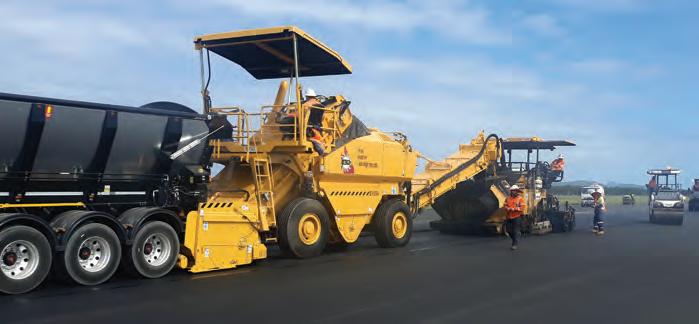
5 minute read
Remixing transfer vehicles
FORWARD THINKING
FOR REMIXING TRANSFER VEHICLES
WEILER HAS CREATED A NEW STYLE OF REMIXING TRANSFER VEHICLE, DISTRIBUTED BY HASTINGS DEERING IN QLD AND NT. PAUL MONTGOMERY, GENERAL MANAGER AT BASE COURSE MANAGEMENT DETAILS ITS USE OF THE MACHINE ON A MAJOR PROJECT FOR SUNSHINE COAST AIRPORT.
The Sunshine Coast Airport welcomes over one million passengers to Queensland each year. To prepare for future growth the airport’s ‘2040 and Beyond Plan’ includes a new runway.
Following planning and construction over the last four years, the runway opened in June 2020, ready to take its first planes as some flights resume following a travel ban as the result of the COVID-19 global pandemic.
A subcontractor for Downer, Base Course Management (BCM), assisted with the laying of asphalt on the runway.
Base Course Management is a specialist road profiling and construction business and is experienced with using the latest milling technology. For this project a remixing transfer vehicle (RTV) was required and BCM chose the Weiler E1650 with a 15-tonne capacity.
Paul Montgomery, General Manager at BCM says when the company researched the Weiler RTV it was clear that the machine would enable the business to continue leading in a whole new area of paving.
“The RTV produces benefits in reducing thermal segregation of the hot mix, removing truck-to-paver contact and provides 15-tonnes of storage in order to promote continuous paving,” Montgomery says.
As compaction of the asphalt mat can be
Base Course Management receiving the Weiler RTV.
affected with uneven temperatures, it is important to ensure the temperature of the asphalt being laid is constant. The Weiler RTV consistently mixes the asphalt as it is transferred to the paver, keeping the mix at a regulated temperature.
With the risk of a feeder truck hitting the paver and causing a bump in the mat, the Weiler RTV’s also act as a middle point, working to ensure the paver is not disrupted by the feeder truck. This reduces the risk of inconsistency in the pavement thickness.
“Continuous paving is a method that helps to achieve a bump free surface, due to the paving machine working at a constant pace,” Montgomery says.
“Each time a paver stops or changes its

Base Course Management assisted with asphalt laying on the Sunshine Coast Airport runway. speed it can result on a bump in the finished surface. The ability of the RTV to store and mix material, gives the crew an opportunity to stockpile material before starting. This allows the mix to continually feed into the paver without stopping once at work.”
Montgomery says the RTV also improved the ride count at the Sunshine Coast Airport project.
“Downer’s preference of RTV was the Weiler, due to the front mounted operator platform and its ability to handle “tough” mixes,” Montgomery says.
He says due to the forward-facing controls the operator has better vision of the site, making it a safer environment, with cameras to assist with any blind spots around the machine.
“There is also better ability to match paver production with variable speed conveyors, which allows less material segregation. The machine even has four-wheel steering making it easier and quicker to manoeuvre.”
The operators at BCM were especially impressed with the visibility when using the RTV.
“Many functions on the machine are automated, this reduces the need for the operator to focus attention on minor areas and frees them up to keep awareness on what is happening around


the machine,” Montgomery says.
“Generally speaking, the feedback has been very positive, and our operators are more than pleased to use it.”
Ryan Van Den Broek, Sales Manager of Road Construction and Infrastructure at Hastings Deering says the Weiler machine is setting the standard for RTV’s going forward.
“I think the front operating platform is the most important feature. In the past we’ve had trouble with ladders coming up to a rear operating station. Having stairs instead of ladders at the front has a higher degree of safety,” Van Den Broek says.
“The other major feature would be the rear steer function. It’s a big machine and you need to have a lot of space to move a big machine around, but we can get it into a tight turning circles which is crucial on some sites.”
Traditionally with material transfer vehicles the operator would have to manually monitor the material levels that are transferred into the hopper, the Weiler E1650 has a built-in hopper level indicator with side lights.
“If levels aren’t monitored properly, the machine could be overloaded; causing possible crushing of stone and segregation of material. The lights are a clear indicator to both operator and dump man of the correct levels,” Van Den Broek says.
“All of these modifications and improvements have come from operators who said it would be nice to have these features on their RTV’s. The changes not only produce better return on investment but also make use of the machine more efficient.”
He says using the Weiler RTV on an airport is the kind of project where its use would be most beneficial.
“Airports are the most critical pavement work because of the speed and impact of the planes coming in. You need to have the best possible pavement by ensuring correct laying techniques and compaction; and having an even temperature spread across the mat is what is required to achieve this.”
The 15-tonne storage capacity of the Weiler E1650 also assists contractors to continue supplying mix to the paver in between truck rotation; reducing the likelihood of stopping and creating bumps in the pavement.
Hastings Deering also offer the Weiler 2850 RTV, which has an even larger capacity of 25 tonnes.
In addition to the features of the RTV, Hastings Deering’s support during commissioning and operating the machine is comprehensive.
A technical expert will spend a week on-site with the contractor ensuring the best operation of the RTV and will visit throughout the machine’s life to ensure its operating at full capability.
“Any time a customer needs extra training, we will always be there to support them with different forms of training. Now it can be harder due to COVID-19 but we are doing online training in some areas,” Van Den Broek says.
“We are currently doing virtual training, through our CAT Paving trainers based in Melbourne for several of our customers. This is becoming very common with current restrictions.”
More Weiler E1650 units are due to be put to work very soon. Both Downer and BCM will continue to use their RTV on many other projects moving forward.
“We are very pleased with the Weiler RTV and the support we received from Hastings Deering throughout the training period. This is the first major piece of equipment we have purchased away from our traditional equipment supplier and has given us the confidence to source more in the future,” Montgomery says.










